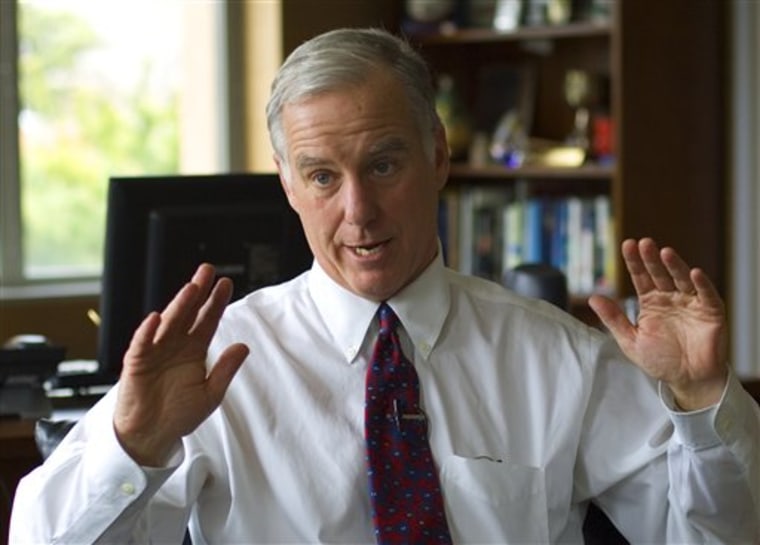Acting swiftly as his party's presumed presidential nominee, Barack Obama is keeping Howard Dean at the helm of the Democratic National Committee, while bringing in one of his top strategists to oversee the party's operations.
The campaign also announced that the DNC will no longer accept donations from lobbyists and political action committees, to comply with Obama's campaign policy. Party officials say they expect the DNC's staff to quickly expand to run an aggressive general election campaign.
Campaign adviser Paul Tewes was dispatched to help lead the changes Thursday.
"Senator Obama appreciates the hard work that Chairman Dean has done to grow our party at the grass-roots level and looks forward to working with him as the chairman of the Democratic Party as we go forward," Obama spokesman Bill Burton said.
By keeping Dean as party chairman, Obama ended up taking sides in a long-running dispute between Washington-based Democratic Party leaders and state party officials. Although Obama campaign officials have expressed concern in the past that the party did not have enough money, Obama shares Dean's goal of building the party from the ground up, even in states where Republicans dominate.
Dean welcomed Tewes to the DNC, saying he would help the party transition to the general election.
"Over the last three years, the DNC staff has worked tirelessly to ensure that the Democratic Party is strong in all 50 states and that we communicate our values to Americans across the country," Dean said in a statement. "The DNC and the Obama campaign are now working together to continue this effort."
"We know that we have a lot of work ahead of us. On everything from the war in Iraq, to privatizing Social Security, to making the disastrous Bush tax cuts permanent, (Republican nominee-in-waiting) John McCain has made it clear that he is more interested in continuing the policies of the past rather than facing America's future."
Drawing a contrast with McCain
The fundraising changes will make the party and the candidate have a consistent position. Obama often says banning the donations is one way to help keep him free of the influence of Washington insiders.
"Today as the Democratic nominee for president, I am announcing that going forward, the Democratic national Committee will uphold the same standard — we will not take a dime from Washington lobbyists," Obama said at a town hall meeting in Bristol, Va.
"We are going to change how Washington works. They will not run our party. They will not run our White House. They will not drown out the views of the American people."
Obama is pressing his case that McCain is under the influence of special interests because of his advisers' lobbying ties.
McCain's senior advisers are former lobbyists, including campaign manager Rick Davis. McCain was stung last month by the disclosure that two advisers worked for a firm that had represented the military junta in Myanmar, also known as Burma, which has restricted foreign assistance for cyclone victims.
The Arizona senator instituted a new lobbying policy that says no campaign staffer can be a registered lobbyist, resulting in three more departures from his campaign, including a top fundraiser, former Texas Rep. Tom Loeffler.
Obama's ban on lobbyists money is not ironclad. He does accept money from lobbyists who do not do business with the federal government and he also accepts money from spouses and family members of lobbyists. He has had unpaid advisers with federal lobbying clients, and some campaign officials also previously had lobbying jobs.
The new fundraising policy is not expected to hurt the party's fundraising ability because lobbyists and PACs do not constitute a major source of money.
DNC officials said Thursday committee had raised $4.7 million in May, bringing the total raised this election cycle to $82.3 million. According to its latest report with the Federal Election Commission, the DNC had raised $2 million came from PACs over the past 16 months. And according to the nonpartisan Center for Responsive Politics, the DNC raised a mere $53,360 from executives or associates in lobbying firms so far this election cycle. That total, however, includes employees of lobbying firms who are not registered lobbyists.
Compared to its Republican counterpart, the DNC has been at a disadvantage.
The RNC on Thursday said it had raised a total of $166 million so far this cycle and had $53.6 million in the bank at the end of May.
The DNC reported having $4 million in the bank at the end of May.
Obama, however, has had a clear fundraising advantage over McCain. The Obama campaign has not released its May fundraising; as of the end of April, he had raised $264 million since the start of 2007.
McCain raised $21.5 million in May and entered June with $31.5 million cash on hand, campaign officials said Thursday. McCain has raised nearly $115 million since the beginning of 2007, with $77 million this year alone.
As DNC chairman, Dean set up a joint fundraising committee earlier to amass money for the eventual nominee. Acceding to Obama's wishes, that committee already was not accepting money from federal lobbyists.
